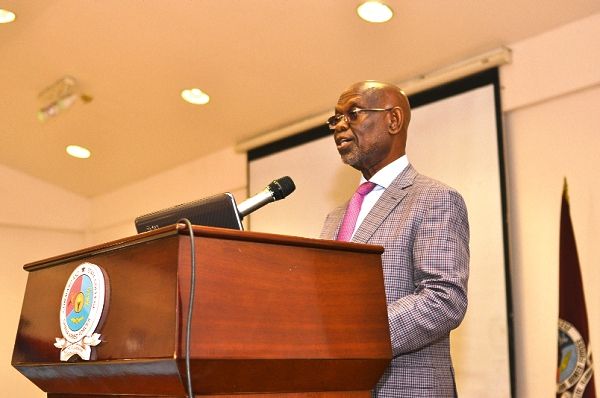
‘America First’ policy could compromise global security, devt — Prof. Kwesi Botchwey
President Donald Trump’s trade policy of ‘America First’ can compromise global security and development, the Executive Chairman of the African Development Initiative, Prof. Kwesi Botchwey, has said.
He said the America First policy "has put global security and development at a grave risk, with dire consequences for the global community.”
He explained that the policy, for instance, had led to America’s withdrawal from multilateral trade agreements in favour of bilateral trade deals.
Speaking on: "Multilateralism in a globalised world and its implications on global stability", Prof. Botchwey said the Trump policy had also led to America's withdrawal from the Paris Climate Change Agreement which America signed and acceded to.
Speaking at the Ghana Armed Forces Command and Staff College at Teshie near Accra as part of the college's series of lectures on contemporary issues, Prof. Botchwey emphasised that such withdrawals could have dire consequences.
Other fallouts from the America First policy included the withdrawal of that country from the Trans-Pacific Partnership, the UNESCO and the UN Human Rights Council and the landmark nuclear agreement with Iran.
In attendance were the High Command of the college, other senior officers of the Ghana Armed Forces, students of the college and other high-profile dignitaries.
Cold War
It was the contention of Prof. Botchwey, a distinguished academic and statesman who managed Ghana’s economy as Finance Minister for an uninterupted 13 years, that President Trump’s election had ushered in a new cold war which promised to be even more widespread than the previous one.
He said the onset of the US-led trade war, marred by the imposition of tariffs on mainly and not limited to Chinese imports, as part of the Trump's America First trade policy, triggered retaliatory actions from affected countries.
He mentioned some of the affected countries as India, China, Brazil, Canada, Mexico and even the European Union, where President Trump imposed tariffs on the importation of vehicles.
He described the American trade policy as an act of desperation, adding that the logic of the policy was flawed.
Power dynamism
Prof. Botchwey said the dynamics of world power were an indication that the time had come for America and the developed world to acknowledge the change in the balance of power.
"There has been a fundamental change in the balance of power. The erosion of multilateralism and the surge in bilateralism will stay with us for a long time to come," he postulated.
Prof. Botchwey, described as an eminent person, both locally and in international circles, explained that countries such as China and India were no longer pushovers, saying it was important that the developed world and America recognised that.
He said America and the developed countries "forget that other countries like China have simply become more efficient, capable of competing at any level”.
Tension
Taking his audience down memory lane on multilateralism, Prof. Botchwey said for 70 years now the head of the International Monetary Fund (IMF) had always been an European, while that of the World Bank an American.
He explained that that arrangement was not going down well with the other countries, particularly the Asians, who felt they were a significant part of the two institutions.
He explained that as the tension intensified, even though the Europeans and the Americans continued to hold on to their dominant roles in the affairs of the two institutions, they began to withhold their contributions, to the disadvantage of the smooth operation of the institutions.
"Not only were they dragging their feet with the funding gaps and maintaining their dominance, they began to politicise these institutions,” he said.
"They were using the IMF and the World Bank to punish countries whose conduct they did not support," Prof. Botchway added.
He said that led to the establishment of regional multilateral institutions, such as the Asian Infrastructure Investment Bank, which operated just like the IMF.
